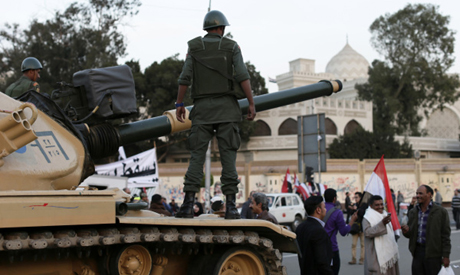
An Egyptian protester takes a picture with his mobile of another in front of an Egyptian army tank outside the presidential palace, background, in Cairo, Egypt, Saturday, Dec. 8, 2012 (Photo: AP)
The national dialogue between Egypt President Mohamed Morsi with public figures got underway Saturday with both side attempting to reach an agreement amid amplifying disputes over the draft constitution and Morsi's recent constitutional declaration, announced presidential spokesperson Yasser Ali.
Morsi attended briefly, along with Vice President Mahmoud Mekki, sitting down with over 40 figures. However, the majority of opposition political forces refused the president's overtures made Friday as mass protests congregated at the presidential palace.
The National Salvation Front, the main opposition group led by former presidential candidates Mohamed ElBaradei, Hamdeen Sabbahi and Amr Moussa, was among those who skipped the meeting.
Among those in attendance were Al-Azhar Sheikh Ahmed El-Tayeb, former Islamist presidential candidate Mohamed Selim El-Awa, the Salafist Nour Party chairman Emad El-Din Abdel-Gafour, founder of the Ghad El-Thawra Party Ayman Nour, the moderate Islamist Al-Wasat Party leaders Abul-Ela Madi and Essam Sultan, and Gamal Gebril, chairman of the System of Government Committee of the Constituent Assembly tasked with drafting the constitution.
Also attending were Islamic preacher Amr Khaled, Al-Ahram columnist Fahmy Howeidy, Montasser El-Zayat, a well-known lawyer for Islamist groups in Egypt, Egypt's top publisher Ibrahim El-Moalem, and former head of the Legislative Committee of the now-dissolved People's Assembly, Mahmoud El-Khodairy.
It is not yet known if the meeting yielded any agreements.
Fierce protests broke out last week after Morsi issued a constitutional declaration 22 November that made his decisions immune to judicial challenge. Critics argue the decree puts Morsi above the law and constitutionality.
While Morsi's supporters believe that the decree enables the president to nip in the bud the manoeuvres of the former regime, including replacing Mubarak-era prosecutor general Abdel-Megid Mahmoud, anti-Morsi protesters believe the elected president betrayed democracy in favour of dictatorship.
The opposition also argues – among other criticisms – that the draft constitution, which should be put to a public referendum soon, limits many freedoms by imposing a stricter version of the Islamic Sharia law.
The presidential office announced Friday during mass protests that Morsi was willing to hold off the referendum slated for 15 December. Morsi already postponed the expat vote, which was scheduled for today.
However, the opposition insists Morsi must annul the constitutional declaration before holding any talks with him.
In the ensuing violence of the past few days, at least seven were killed and over 1000 injured. Assailants on both sides used firearms and bladed weapons.
Short link: